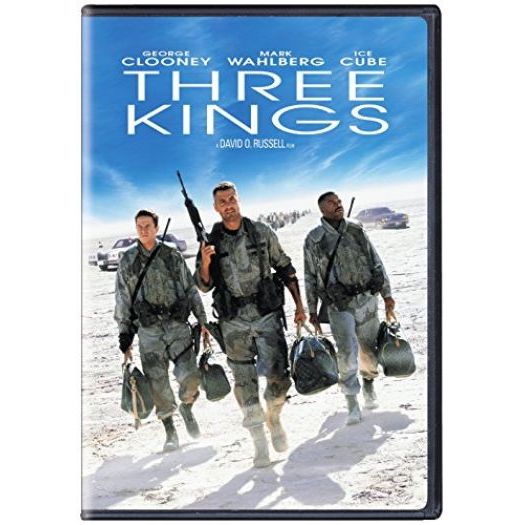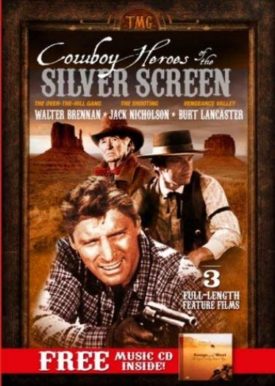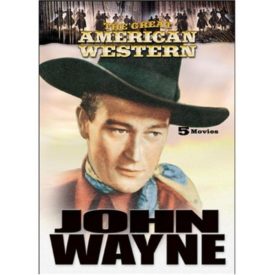Three Kings (DVD)
Other Marketplace Price: $17.99Sale Price:$10.49
- Ships Same Day.
- FREE Shipping (U.S. Delivery).
- International Shipping (See Shipping Chart Below).
Out of stock
| Shipping US FREE SHIPPING |
FREE Shipping! |
|---|---|
| Shipping US Expedited 2-3 Day |
US Shipping: $14.99 Unlimited Items. |
| Shipping Canada |
Canada Shipping: Flat $34.99. |
| Shipping Int'l Standard | International Shipping: $64.99 Worldwide. |
| Shipping Local Pick Up |
FREE Local Pick Up in Store |
| Condition | New |
|---|---|
| Actor | Bruce Berman, Charles Roven, Edward L. Mcdonnell, Gregory Goodman, John Ridley, Kelley Smith-Wait, Paul Junger Witt |
| Publisher | Warnerbrothers |
| Published Date | 2010-09-28 |
| Age Group | Adult |
| Recording Studio | Warnerbrothers |
| Format | DVD |
| Brand | Studio Distribution Servi |
| Rating MPA | R |
| Amazon ASIN | B002O3Z4Z2 |
| UPC / EAN | 883929091645 |
| Year | 1999 |
| ReleaseDate | 1999-10-01 |
| RuntimeMins | 114 |
| RuntimeStr | 1h 54min |
| Awards | Awards, 8 wins & 19 nominations |
| Directors | David O. Russell |
| Writers | John Ridley, David O. Russell |
| Stars | George Clooney, Mark Wahlberg, Ice Cube |
| Produced by | Bruce Berman, Robert S. Costanzo, Alan Glazer, Gregory Goodman, Paul Junger Witt, Edward L. McDonnell, John Ridley, Kim Roth, Charles Roven, Douglas Segal, Kelley Smith-Wait |
| Music by | Carter Burwell |
| Cinematography by | Newton Thomas Sigel |
| Film Editing by | Robert K. Lambert |
| Casting By | Anne McCarthy, Mary Vernieu |
| Production Design by | Catherine Hardwicke |
| Art Direction by | Jann K. Engel, Derek R. Hill |
| Set Decoration by | Gene Serdena |
| Costume Design by | Kym Barrett |
| Makeup Department | Allan A. Apone, Jim Beinke, Adam Brandy, Sandra A. Coley-Greene, Clifton Dance, Michelle Garbin, Tony Gardner, Barry R. Koper, Janet Laszlo Santa, Donald Mowat, Karen Rich, Tina Sims, Ron Snyder, Robert L. Stevenson, Alicia M. Tripi, Christine M. Guararra, Sean Kenney |
| Production Management | Daniel R. Chavez, Gregory Goodman, Ronald G. Smith, Bill Draper, Héctor López |
| Second Unit Director or Assistant Director | Paul F. Bernard, Dan Bradley, John Downer, Kent Genzlinger, Terry Ham, Amy B. Hughes, Lisa C. Satriano, Rebecca Stefan, Julian Wall, Eric Yellin |
| Art Department | Terry Atchison, Adam L. Barker, Chris Barnes, Helen Britten, Frank Calvert, Rick Chavez, Craig Cheply, Raymond Consing, Jack Cornelius, Tim Dingle, Matthew D. Egan, Robert Fechtman, Scott Garrett, Chuck Herrmann, Kearsley Higgins, Richard M. Jones, Christian Kastner, Michael Kolb, Larry D. Koszakovszky, Robert Lucas, Ron Mendell, David J. Negron Jr., Carla S. Nemec, John M. Oswald, Michael Papac, Lars Petersen, Jonathan Robertson, Lee Ross, Theodore Sharps, Joel D. Spencer, Kristen Spinning, Tracy Stockwell, Keith Van Velson, Steven C. Voll, Lynny Warner, Dean Wilson, Jim Zemansky, Ralph Michael Brekan, Susan A. Burig, Alan Feffer, Tom Frohling, Bill Garber, John B. Josselyn, John M. Oswald, Danielle Quilici, Karl Swauger |
| Sound Department | Bob Beher, Brian Best, Gary Blufer, Michael Broomberg, Lance Brown, Marc Deschaine, Joe Dorn, Michael Dressel, Dan Fontana, Bruce Fortune, Michael Herbick, Jonathan Klein, Nicholas Korda, Mary Jo Lang, Lance Laurienzo, Daniel J. Leahy, John Leveque, Robert J. Litt, Kimberly Ellen Lowe, Steve Mann, Anthony Milch, Alyson Dee Moore, Thomas J. O'Connell, Alenka Pavlin, Lisa Pinero, Terry Rodman, John Roesch, Alessandro Savino, Mike Shuman, Shawn Sykora, Edward Tise, Robert Troy, Donald L. Warner Jr., Aaron D. Weisblatt, Keenan Wyatt, Richard E. Yawn, Patrick Cicero, J. Aloysius Flanagan III, Kate Jesse, Marsha Sorce, Carolyn Tapp, Kevin Webb |
| Special Effects by | Garnet Baril, Jeff Bresin, Martin Bresin, Mike Brown, Dan Edwards, Dale Ettema, Werner Hahnlein, Chris Jones, G. Peter King, David A. Poole, Michael Roundy, Russell Shinkle, Robert Simokovic, Gary Snyder, Ron Thompson, Mike Van Arkel, Tim Walkey, Richard Zarro |
| Visual Effects by | Kelly Bechtle-Woods, Tommy Dorsett, Joe Gareri, Robert Hubbard, Kenny Lam, Janet Quen, Todd Sarsfield, Carl Seibert, David Sosalla, Brian Hanable, Rafael Macho, Evan A. Nesbitt, Siouxsie Stewart, Bob Wiatr |
| Stunts | Diego Amarosa, Chino Binamo, Dan Bradley, Chad Camilleri, Jay Caputo, Max Daniels, Paul Eliopoulos, Uzi Gal, Richie Gaona, Mickey Giacomazzi, Glenn Goldstein, Rosine 'Ace' Hatem, Nick Hermz, Ben Hernandez Bray, Sammy Maloof, Patrick Mark, Brad Martin, Eddie Matthews, Bobby Ore, Jane Oshita, J.J. Perry, Gary Robert, Misty Rosas, John Rottger, Cheryl Rusa, George A. Sack Jr., Ofer Samra, Chris Sayour, Brandon Sebek, Hashem Shaalan, Hash Shallan, Rudolf Weber, Keith Woulard, Pete Antico, Leo Arroyo, Cheryl Bermeo, Laura Dash, John Escobar, Michael Hilow, Brad Martin, Gunner O'Moore, Spiro Razatos, Cheryl Rusa, Kevin Scott, Ray Siegle, Mary Torres, T.J. White |
| Camera and Electrical Department | John Bonnin, Erik L. Brown, Stephen Carmona, Murray Close, Keith Collea, William Coss, Don Duffield III, Isaac Friedman, Keith Gorman, Anthony M. Gutierrez, Terry Hall, Daniel Hernandez, Samuel Hughes, Joel Jaspan, Jimmy E. Jensen, Ian Kelly, Amy La Licata, Thomas Lappin, Lynn Lockwood, Kyle T. MacDowell, Susie Masterson, Larry McConkey, David L. Merrill, Anthony G. Nakonechnyj, Evan A. Nesbitt, Mike 'Chewie' Pappas, Philip C. Pfeiffer, Melissa Roth, Thomas J. Ruffner, Gregory J. Schmidt, Geoffrey Wing Shotz, Keith L. Smith, John Stewart, John Stradling, Bill Summers, Joseph F. Valentine, William D. Wynn, Ross Corsair, John Curry, Julie Helton, Mansur Johnson, Chris Wagganer |
| Casting Department | Ed Arenas, Tina Kerr, Freddy Luis, Alex Newman, Deedra Ricketts, Tana Roller, Salah Salea, Rachael Erwin |
| Costume and Wardrobe Department | Gina G. Aller, Javier Arrieta, Darryl M. Athons, Dan Bronson, Blanca Garcia, Gilbert S. Hernandez, Hector Morales, Bob Morgan, Elaine Ramires, Carlos Rosario, Lori Jean Sacks, Peggy A. Schnitzer, John M. 'Jack' Wright |
| Editorial Department | Dexter N. Adriano, Mark Bourgeois, Clark Campbell, Mo Henry, Gloria Kaiser, Pamela March, Alan Z. McCurdy, Ronald White, Todd Busch, Bill Daly, Jonathan Malden |
| Location Management | Michael S. Dunitz, Nancy Haecker, Efrain Lomeli, Peter J. Novak, Nathan Polatin, David L. Wolfson, Julie Duvic, Lily Flaschner |
| Music Department | Bunny Andrews, Tom Boyd, Tom Brown, Carter Burwell, Wade Culbreath, Sandy DeCrescent, Bruce Dukov, Michael Farrow, Daniel Gold, Jim Hoffman, Brian Kilgore, Sonny Kompanek, Norman Ludwin, Lisa Donovan Lukas, Ralph Sall, Marni Sanders, Adam Milo Smalley, Steven L. Smith, James Thatcher, David Torn, Richard Wolf, Maguy R. Cohen, Zigmund Gron |
| Script and Continuity Department | Betty Hugo, Haley McLane, Nicole Stavro, Jack Shaheen |
| Transportation Department | Robert Garcia Jr., Lee Garibaldi, William Hogue, Gene R. Johnson, Jerry Sidwell, Brian Steagall, Phil Strauss, Tommy Tancharoen, David Wang, Tom Whelpey, Kip Wolverton |
| Additional Crew | Sermid Al'Serrif, Qaid Al-Nomani, Sayed Moustafa Al-Qazwini, Kim Bauman, Lisa Bertuzzi, Robert Cable, Daniel R. Chavez, Amy Minda Cohen, Herman Cohen, Mary Courtney, Julie Cummings, Tamela D'Amico, King Davis, Maria De La Torre, Kristen Dolan, Michael Feuerhelm, Kimberly Franklin, Tony Gardner, Larry Hand, Jessica Hill, Peter Hollocker, Catherine Hughes, Timalee Hustin, Polly Johnsen, Merritt Johnson, Chrissy Kernes, Shelley Kirkwood, Kate Kondell, Troy Kramer, James P. Lucero Jr., Abbie Ludwig, Jennifer P. Luther, Mike McNally, Bob Merrick, Gary Moglovkin, Bruce Morin, Ronald G. Muhammad, Niamh Murphy, Jean Nakahara, Carla S. Nemec, Janine McEuen Newell, Stacie O'Beirne, Alex Orellana, Jim Parker, Mike Patlin, Monique Perez, Chrissy Phelan, Kenneth Pratt, Bill Purple, Golan Ramraz, Nadia Randazzo Bombino, Angela Randazzo, Shannon Ratcliffe, John Rottger, Sam Sako, Dominic Sbardella, Hillary Schwartz, Rick Shuster, Linda Stanley, James Patrick Stoteraux, Lisa Swain, Edith Thornton, Louis Timalot, Stephen M. Vernarelli, Elpe Villard, Eric Weinstein, Sheldon Zwerling, Julie Adams, Kristie Breslin, Kyle Cooper, Curtis DeMartini, Jason Gondek, Lora Hingst, Jeffrey Reyes, Scott Stravitz, Kurt Zelnak |
| Thanks | Jim Parker |
| Genres | Action, Adventure, Comedy |
| Companies | Warner Bros., Village Roadshow Pictures, Village-A.M. Partnership |
| Countries | USA |
| Languages | English, Arabic |
| ContentRating | R |
| ImDbRating | 7.1 |
| ImDb Rating Votes | 171326 |
| Metacritic Rating | 82 |
| Short Description |
Three Kings is a 1999 American black comedy war film written and directed by David O. Russell from a story by John Ridley. It stars George Clooney, Mark Wahlberg, Ice Cube, and Spike Jonze as four American soldiers on a gold heist that takes place during the 1991 uprisings in Iraq against Saddam Hussein following the end of the Gulf War. The film was released on October 1, 1999, in the United States. It received critical acclaim and was a box office success, grossing $107 million on its $48 million budget. |
| Box Office Budget | $75,000,000 (estimated) |
| Box Office Opening Weekend USA | $15,847,636 |
| Box Office Gross USA | $60,652,036 |
| Box Office Cumulative Worldwide Gross | $107,752,036 |
| Keywords | Original story,heist,sex on a chair,woman on top,cell phone trace |







 Item is New Stock.
Item is New Stock. 

